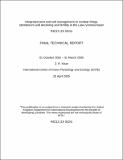Integrated pest and soil management to combat striga, stem borers and declining soil fertility in the Lake Victoria Basin

View/
Publication Date
2005-04-20Author
Zeyaur Khan, Hugo De Groote, Fred Kanampiu, Joseph Kikafunda, Dickens Nyagol, George Odhiambo, Esther Rutto, Ignath Rwiza, Bernard Vanlauwe
Metadata
Show full item recordAbstract/
Demonstrations with best-bet technologies for the control of Striga weed and stemborers and enhancement of soil fertility were initiated in the long rainy season (March to July) of 2003 in Kenya and Uganda and during the more reliable second rainy season (October 2003 to January 2004) of 2003/04 in Tanzania. Components of these best-bets were cropping systems (maize intercropped with stemborer moth-repellent Desmodium [‘push’] with stemborer moth-attractant [‘pull’] Napier grass planted around the field [push pull system], continuous maize and rotations with grain [soybean] and herbaceous [Crotolaria] legumes). Their effect on suppression of Striga and stemborers and soil fertility improvement were compared using two maize varieties (Imidazolinone resistant [IR] and a local landrace or improved commercial variety) under two fertilizer levels (no fertilizer and medium fertilizer). Stemborer damage to maize varied substantially between locations and seasons in all countries and the push pull technology was observed to suppress stemborer damage from the second (Kenya/Tanzania) or third (Uganda) season onwards. IR maize fully controlled Striga emergence in Tanzania and substantially suppressed Striga emergence in Kenya. In Uganda, IR maize did not show any effect on Striga emergence. The push pull technology equally suppressed Striga emergence but again only after 2 or 3 seasons. Other systems or fertilizer application did not show significant reductions in either stemborer or Striga infestations. These notwithstanding, differences in grain yield of maize between cropping systems were minimal and only fertilizer application …
